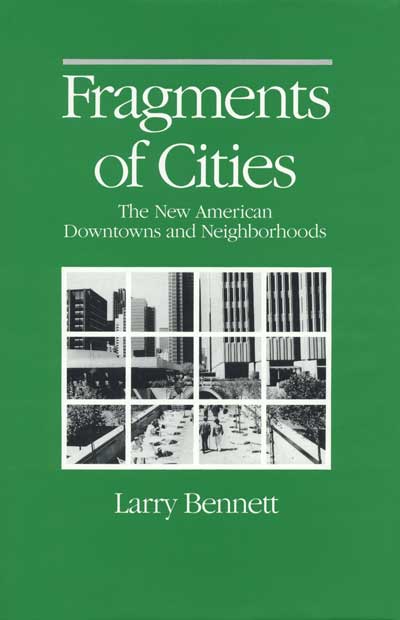
Fragments of Cities
The New American Downtowns and Neighborhoods
Larry Bennett
“Displaying the good sense to begin his foray in Chicago’s Wrigley Field, Bennett’s chief concern is the urban environment as lived and experienced by the masses. Rather than a politician’s or a planner’s view from city hall, Bennett offers a wanderer’s view from the streets. . . . The author’s determination to assess cities as human and humane environments seems refreshing.” —Reviews in American History
Larry Bennett’s Fragments of Cities: The New American Downtowns and Neighborhoods examines the social consequences of both the new approaches to downtown design and the physical upgrading of residential neighborhoods.
Bennett draws upon lively case studies—ranging from Detroit’s Renaissance Center to New York City's SoHo to Chicago’s Wrigley Field—to relate physical redevelopment and urban social life. He demonstrates that a small, well-located delicatessen can bring people together while clusters of multi-million-dollar office centers in renovated downtowns can drive them apart.
Bennett’s evaluation of contemporary urban rebuilding, which is unique in giving equal attention to the political, economic, and social impact of urban design and rebuilding, is frequently pessimistic. He finds that the gentrification of many big-city neighborhoods and the design strategies characterizing new downtowns do little to promote street life, unplanned social encounters, or public life in general. Bennett also contends some advocates and practitioners of the much-praised neighborhood movement have chosen isolation and local security as their primary goals, thus echoing in their concerns the physical plans developed by urban designers. In contrast, Bennett argues, both groups should embrace a vision that encompasses the entire city, or they will risk losing some of the best things cities encourage—surprise, tolerance, innovation, and democratic participation.
Bennett does find cause for optimism in the designs of some particularly innovative architects and planners, and he praises the broadening initiatives taken by many residents acting independently to give life to their cities. American cities face a crossroads, he says, and must choose between becoming genuine communities or a series of isolated zones.
Larry Bennett is Associate Professor of Political Science at DePaul University.
| 1990 171 pp | |
| $44.95 cloth 978-0-8142-0524-2 | Add cloth to shopping cart |
| Urban Life and Urban Landscape |


